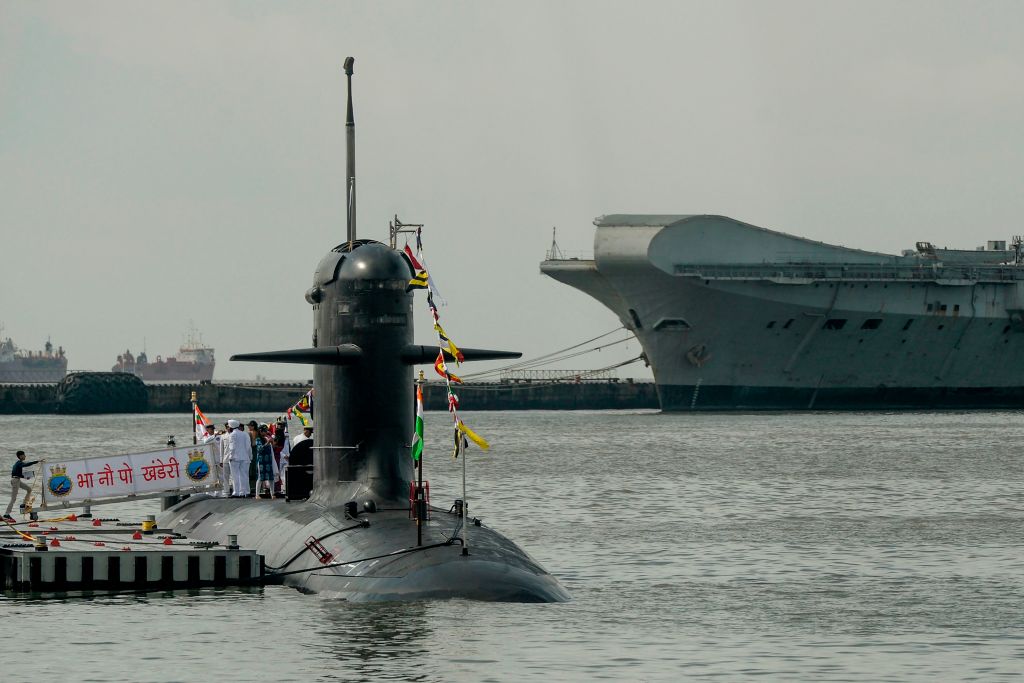
The AUKUS strategic partnership of Australia, the United Kingdom and the United States has created a kerfuffle whose echoes have been heard from the Indo-Pacific to the Atlantic. Canberra is relieved, Beijing is enraged, Paris feels slighted and Southeast Asia is scared as Washington prepares to part with its closely held nuclear submarine technology.
Yet, New Delhi’s reaction has been relatively reserved. The only direct remark on AUKUS came from Foreign Secretary Harsh Shringla, who suggested the deal was a strategic alliance among the three Anglo-Saxon powers and therefore irrelevant since it would have no impact on the functioning of the Quad.
Analysts have suggested India should be skeptical of AUKUS, cautioning that it could damage the Quad as it gains momentum. AUKUS, they say, could create a central security core within the Quad and relegate the rest of the grouping to soft security issues. An overzealous Indian response to the US providing this technology to Australia wouldn’t just rile the Russians, on whom India’s nuclear submarine program depends, but also the French, who are already fuming over the loss of the conventional submarine deal with Canberra and the diplomatic embarrassment at the hands of their so-called allies.
Perhaps most important is the contention that despite the momentous growth in the India–US strategic partnership, Washington won’t share top-shelf defence technologies with New Delhi even when India’s needs are the most pressing given the threat China poses on its Himalayan border.
But these concerns underestimate the potential benefits of AUKUS for India’s nuclear submarine program, the global market for sensitive military technology and the evolving balance of naval power in the Indo-Pacific.
India is weighing the likely impact of the AUKUS arrangement on its own nuclear submarine program and the prospect of the US helping it build a fleet of nuclear-powered attack submarines (SSNs). Of the four Quad countries, only the US and India have indigenous nuclear submarine programs. So far, India has concentrated on nuclear-powered ballistic-missile-carrying submarines (SSBNs) to complete its triad of nuclear-delivery platforms.
India’s nuclear submarine program is based on Russian technology. However, India’s strategic planners are keen to procure SSNs and to lessen the Indian military’s dependence on Russia. The navy wants
six SSNs.
The program is stuck for two reasons. While India has absorbed considerable nuclear propulsion expertise through its SSBN program, it’s based on antiquated Russian technology from the 1970s. India’s
SSBN fleet is very underpowered. The reactor aboard the first of its submarines, INS
Arihant, can produce barely 85 megawatts of energy compared with the 190 megawatts from modern attack submarines.
Power isn’t a huge issue for SSBNs, however, because their missions don’t require constant surveillance of or engagement with an adversary’s naval assets. SSN reactors need to withstand very high-power ramping or power fluctuations, and New Delhi and the navy aren’t confident of the indigenous program’s capacity to satisfy this requirement—at least not yet. More importantly, it’s difficult to find suitable foreign vendors. France and Russia are the only states offering nuclear propulsion. They can sell what they want, at the price they want. The lack of vendors is exacerbated by nuclear nonproliferation restraints.
The US decision may have an impact on the monopolistic market for nuclear submarine technology. Even if Washington may not sell to New Delhi, the possibility that it might will strengthen India’s negotiating position with the French and the Russians. New Delhi has expressed an interest in French Barracudas at the highest level but has received no firm response so far. However, the prospect of French assistance made Moscow offer its new Yasen-class SSNs. By inducing competition in the market from a new vendor that has both better technology and the right motivation to help, AUKUS has substantially enhanced India’s bargaining power.
The greater significance, however, has been the shift in US strategic intent, which now clearly prioritises the norms of power over the power of norms. The relentless Chinese onslaught and fear of peer competition have made Washington realise that the liberal system it aims to preserve might not survive its decline.
If that means relaxing some of its most cherished norms—nonproliferation of sensitive military technology and regional stability—the US is willing to pay the price. One reason for initial French reluctance to offer nuclear propulsion technology to both Australia and India was the constraint imposed by US nonproliferation policies.
The French anger over AUKUS is also an expression of its frustration in overestimating American idealism and underestimating its realism. Now AUKUS has eased the transaction costs for both buyers and sellers of nuclear propulsion.
The Indo-Pacific democracies believe that ensuring their maritime safety in the face of rapidly growing Chinese naval power lies in dividing the defence of the Indo-Pacific among their zones of interest and influence. Enhancing the capability of individual Quad members complicates Chinese naval strategy by dividing the focus and concentration of its naval forces. Building superior naval power across maritime zones will be costly for China, irrespective of the current trajectory of its naval growth.
And as Quad members substantially augment their naval capabilities, decision-makers in Beijing will have to weigh the gains of imposing their claims and influence against the costs associated with accidental, inadvertent or even deliberate escalation. In the long run, the systemic effects of AUKUS will benefit New Delhi’s interests in the Indian Ocean.
Beijing has long held the view that it can ‘scare the monkey by killing the chicken’. The US has finally thrown down the gauntlet to Beijing. In doing so, it has also opened India’s strategic space. India has more autonomy to pursue its interests in the post-AUKUS world than it had before.
 Print This Post
Print This Post